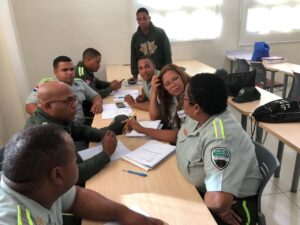The Technical Commission for the Restructuring of the Educational System of the National Police is developing a self-evaluation of the actions that make up the strategy to continue advancing in the Educational Reform of 40,000 police officers, of which 3,000 have already been trained with the complementary educational programs.
The academic program that complements the training and regulatory classes of police officers aims to strengthen their work, in accordance with human rights, ethics, conflict management and the appropriate use of force.
Since the beginning of the implementation of the courses, in 2022, the Technical Commission has trained 3,000 police officers, in 102 groups, who are on duty.
The objective for 2024
For the year 2024, it is planned to train some 5,000 more agents. To this end, a program has been built with the necessary logistics to guarantee the proposed objective, which means more classrooms and teachers who will transform the police officers to guarantee service to the citizens in accordance with ethical and moral principles.
 The contents studied by the students in the gray uniform are personal and interpersonal skills, self-knowledge, self-control, emotional intelligence, assertive communication and conflict management.
The contents studied by the students in the gray uniform are personal and interpersonal skills, self-knowledge, self-control, emotional intelligence, assertive communication and conflict management.
Subsequently, they take a second module, which deals with human rights, citizen coexistence, constitutional law, democratic values, ethics, authority and rational use of power and force.
Teachers of new police officers
With 80 specialist teachers in each of the subjects, endorsed by their resumes and public trajectory, they develop their classes in the classrooms of 13 member universities of the Dominican Association of Universities (ADRU), in compliance with the agreement signed last year.
A commitment to transformation
Mukien Sang Ben, executive director of the Technical Commission said that, “the continuity of the complementary program in different regions of the country is thanks to the support of the President of the Republic, for the follow-up and special attention, also, to the assistance and commitment of the member agents of the law enforcement institution and to the agreement signed by 13 universities belonging to the ADRU”.
The training project is developed under the direction of the Civic Education Consortium of the Pontificia Universidad Católica Madre y Maestra (PUCMM), which implements the program of complementary courses and is coordinated by Dr. Aida Consuelo Hernández Bonnelly.
Teaching method
Hernández Bonnelly explained that the methodology used seeks to ensure that the knowledge acquired is not limited to theoretical concepts, but that the officers can apply it in their police work. Case studies, dramatizations, debates and comments and group work are some of the strategies used in the complementary courses.
The academic calendar is being developed in La Romana, by UCE; Barahona, Jimaní, Neyba and Pedernales, by Ucateba; La Vega, by Ucateci; Cotuí, by Uteco; San Francisco de Macorís, by UCNE and in Santiago, by PUCMM. Inesdyc, Unapec, UNPHU, Unade and PUCMM are responsible for the training of the agents who provide services in Greater Santo Domingo and San Cristobal, among other provinces, is the origin of the young people trained, which has guaranteed the inclusion of agents from all provinces nationwide.
Source: Presidencia.gob.do
Know More: News

